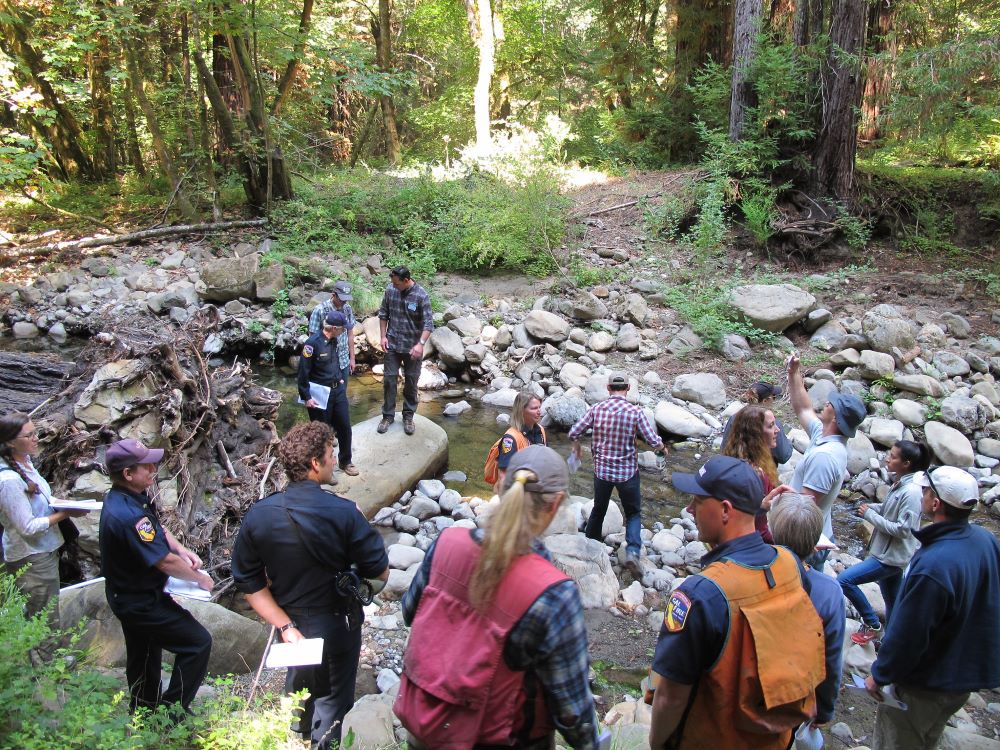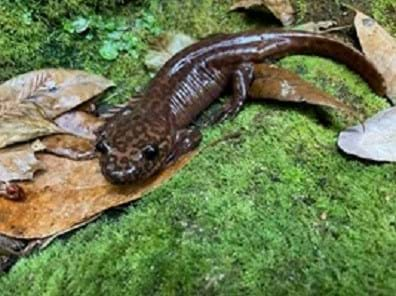Soquel Demonstration State Forest
Outbreak of Potentially Deadly Amatoxin Poisoning Linked to the Consumption of Wild, Foraged Mushrooms
What You Need to Know: An outbreak of serious illness associated with eating foraged wild mushrooms has been reported. CDPH is urging individuals to avoid foraging for and eating wild mushrooms while risk of amatoxin poisoning is high.
Learn more about the risks
Poisonous Mushroom Poster (PDF)
Soquel Demonstration State Forest (SDSF) is situated in the Santa Cruz Mountains along California's central coast. Originally part of a Mexican land grant, the property was logged by several different owners prior to the State taking ownership in 1988. Today, the forest is managed for sustainable timber production, research, educational activities, public recreation, fish and wildlife habitat, and watershed protection. SDSF is unique because it is the only State Forest located near large urban areas. Its proximity to the metropolitan centers of the San Francisco Bay Area and Monterey Bay Area provides excellent opportunities for hands-on forestry education and outdoor recreation while demonstrating a working forest for the public.
SDSF contains coast redwood, Douglas-fir, mixed hardwood, chaparral, and riparian ecosystems along the East Branch of Soquel Creek and Amaya Creek. The forest is geologically active, with the San Andreas and Zayante Faults passing through the property. There are several natural springs and small marshes found in closed depressions that are associated with the forest’s geologic activity. The epicenter of the 1989 Loma Prieta earthquake is approximately two miles south of SDSF, in the neighboring Forest of Nisene Marks State Park.
Soquel Forest Stats
Established: 1990
Area: 2,700 acres
Elevation: 450 - 2,400ft
Precipitation: 47.53 in per year
Temperature: Max: 90 F - Min: 32 F
Soquel Demonstration State Forest Roads and Trails Map
CAL FIRE Soquel Demonstration State Forest | Facebook
Soquel Demonstration State Forest Weather Website (westernweathergroup.com)

- Restore and enhance the natural resources within the forest, including watershed protection.
- Provide public recreational uses that are consistent with protection of SDSF.
- Develop a forestry education program for the public, schools and interested organizations.
- Demonstrate sustained-yield timber harvesting sufficient to cover forest operations and management costs.
- Protect old-growth redwood trees.
- Provide research opportunities in forestry and natural resource management.
The overarching management goal for SDSF is to maintain the forest as a managed working demonstration forest typical of managed forests in the area with a range of successional stages across the Forest. Early to late successional forest stages are managed across the landscape over time to meet research and demonstration mandates in the context of a changing climate, continually changing societal preferences and research needs.
Hardwoods are a significant component of SDSF and are evaluated during wildlife and timber management planning. One aspect of hardwood management is to examine and experiment with alternative uses for hardwoods. Hardwoods can be utilized as firewood.
Redwood regeneration in the Fern Gulch Timber Harvest area in Soquel Demonstration State Forest. In most cases, forest regeneration occurs naturally after harvesting. This is common in SDSF since the dominant tree species, coast redwood, sprouts quickly and vigorously from remaining stumps given sufficient light.
SDSF Timber Harvest History
| 1995 Longridge | 1998 - 1999 Amaya | 2011- 2012 Rim | 2012 Fern Gulch | 2014 - 2015 Comstock Mill | 2017 - 2018 Meridian | 2020 Longridge | Totals | |
| Acres | 50 | 148 | 158 | 201 | 228 | 220 | 158 | 1229 |
| THP # | 1-94-307 SCR | 1-98-027 SCR | 1-09-107 SCR | 1-09-096 SCR | 1-13-027 SCR | 1-15-139 SCR | 1-18-047 SCR | |
| Advertised Volume | 550,000 BF | 1,512,000 BF | 1,826,300 BF | 2,573,000 BF | 1,972,000 BF | 1,637,000 BF | 739,000 BF | |
| Volume Removed | 556,130 BF | 1,605,620 BF | 1,594,750 BF | 2,229,330 BF | 2,134,060 BF | 2,428,780 BF | 808,830 BF | 11,357,500 BF |
| Purchaser | Big Creek Lumber | Redwood Empire Sawmills | Sierra Pacific Industries | Big Creek Lumber | Big Creek Lumber | Redwood Empire Sawmills | Big Creek Lumber | |
| Milling Location | Davenport | Cloverdale | Sonora, Chinese Camp and Davenport | Davenport | Davenport | Cloverdale, Chinese Camp | Davenport | |
| Net Receipts | $90,502 | $314,680 | $594,458 | $758,220 | $922,816 | $1,427,405 | $411,620 | $4,519,701 |
SDSF is a 2,700-acre working forest. The conifer inventory on SDSF is approximately 117,376,000 board feet and the annual conifer growth is 2,615,000 board feet. Seven timber harvests have occurred at SDSF since 1995 (totaling 11,337,500 board feet). The eighth Timber Harvesting Plan (THP) is scheduled to occur in 2022. The current harvest rate planned is for about 1,000,000 board feet to be harvested per year. Revenue from these harvests funds the management of the State Forests.
Redwood cones are collected at the forest during high production years. Redwood seeds are processed, stored and grown at the CAL FIRE L.A. Moran Reforestation Center in Davis, California. Redwood seedlings grown from seed collected in SDSF are planted in timber harvest areas and on privately-managed forest lands throughout the Santa Cruz Mountains.
Redwood seedling planting in the Meridian Timber Harvesting area in 2019. Supplemental tree planting takes place in areas for research and demonstration purposes and in areas that do not regenerate sufficiently such as areas of Douglas-fir.
SDSF serves as a laboratory to examine various forest management techniques in a coastal redwood forest ecosystem. Projects are done in-house and by outside agencies, interest groups or educational institutions. These demonstrations include stream restoration, forest thinning for fire resiliency, burning and regeneration studies. Data collected during demonstrations provides private landowners with information to make their own land management decisions.
Forestry education opportunities are provided for the public, forest landowners, the educational community, the media, natural resource professionals and environmental groups. SDSF takes these opportunities to teach about the multi-use nature of SDSF and displays how sustainable yield timber harvest, resource protection and recreation can be compatible.
SDSF covers rugged terrain and many areas with difficult access. Emergency response can take an extended period of time in some areas and cell phone reception is not consistent. Please be always safety conscious. Travel with others when possible and let someone know of your plans. There is no developed water source in the Forest and poison oak and ticks are common.
- No e-bikes are allowed at the forest.
- Bring plenty of water.
- Advanced terrain exists on mountain biking trails. Ride within your limits.
- Practice trail etiquette. Ride at a safe speed.
- Be courteous to other forest visitors. Bikers yield to horse riders and hikers; hikers yield to horse riders.
- Braille Trail, Flow Trail and Sawpit Trail are recommended for downhill traffic only. Watch for and expect two-way traffic on roads.
- Respect private property by not trespassing onto adjacent private lands.
- Check signboards and the SDSF Facebook page for any current closure areas.
- Keep trails in good condition by not riding when soils are saturated. Stay off trails during wet weather and wait at least one day for each inch of rainfall before riding for trails to dry out.
- Report problems and hazards to SDSF staff. Please call 911 in an emergency.
- Watch for and expect forest management traffic on forest roads.
- SDSF Roads and Trail Maps
- “Thinking of Mountain Biking at SDSF?”
SDSF staff partners with Santa Cruz Mountain Trail Stewardship (santacruztrails.org) for trail maintenance and trail projects within the forest. This partnership with the mountain biking community has led to additional high-quality trails supported by donations and volunteers. The forest remains open to the public at most times during daylight hours. However, some areas are subject to temporary closure for forest management activities.
Outbreak of Potentially Deadly Amatoxin Poisoning Linked to the Consumption of Wild, Foraged Mushrooms
Poisonous Mushroom Poster (PDF)
Dozens of research projects, studies and monitoring projects have been completed and are in process at SDSF including: archaeology research, biological assessments, annual fish population monitoring, geologic assessments, watershed assessments, recreation studies, stream habitat surveys, bird surveys, herpetology surveys, stream temperature monitoring, Sudden Oak Death research, instream Large Woody Debris assessments, restoration and monitoring, tick borne disease research and mountain lion research.

SDSF recently received funding from the California Climate Investments, Forest Health Program to perform landscape-level fuel reduction and forest health treatments (Project ID 20-FH-CZU-059). There will be ongoing research to evaluate the effect of these activities on the landscape. View the list of grant awards.
Research Partners at SDSF
- UC Davis Veterinary Medicine Laboratory in Infectious Disease Ecology
- Cal Poly Natural Resources Management
- Environmental Sciences and Swanton Pacific Ranch
- California Geological Survey
- Santa Cruz Puma Project
- North American Field Herping Association and the Herpetological Education and Research Project (HERP)
- UC Berkeley Forest Pathology and Mycology Lab
Visitors to the forest enjoy bicycling, hiking, picnicking and horseback riding. While recreating in Soquel Demonstration State Forest, please keep these rules in mind.
1. The forest is open from dawn to dusk for day use only. No camping permitted.
2. The forest entrance is located at 29400 Highland Way, Los Gatos.
3. No motorized vehicles are allowed in the forest. This means No E-bikes or bikes with pedal assist.
4. Mountain bikes must stay off trails when it is raining, or soils are saturated.
5. Horses and mountain bikes must stay on designated roads and trails.
6. Park smart. Do not impede emergency access by blocking fire roads or gates.
7. California Fish and Wildlife regulations prohibit fishing in the East Branch of Soquel Creek.
8. Firearms of any kind are not allowed.
9. Pack your trash out
10. Pets are welcome but must be on a leash.
11. Smoking or fires of any kind are not allowed in the forest due to the associated fire risks.
Soquel Demonstration State Forest Public Entrance
29400 Highland Way
Los Gatos, CA 95033
Soquel Demonstration State Forest Headquarters Office
3065 Porter Street, Suite 105 Soquel, CA 95073
Phone: (831) 475-8643
Email: soquel.stateforest@fire.ca.gov